Iran
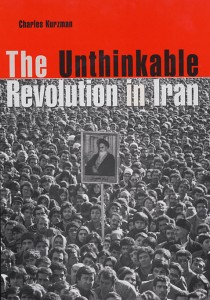
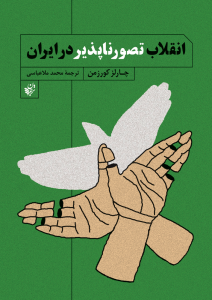
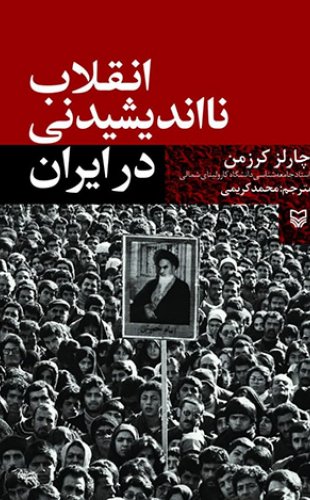
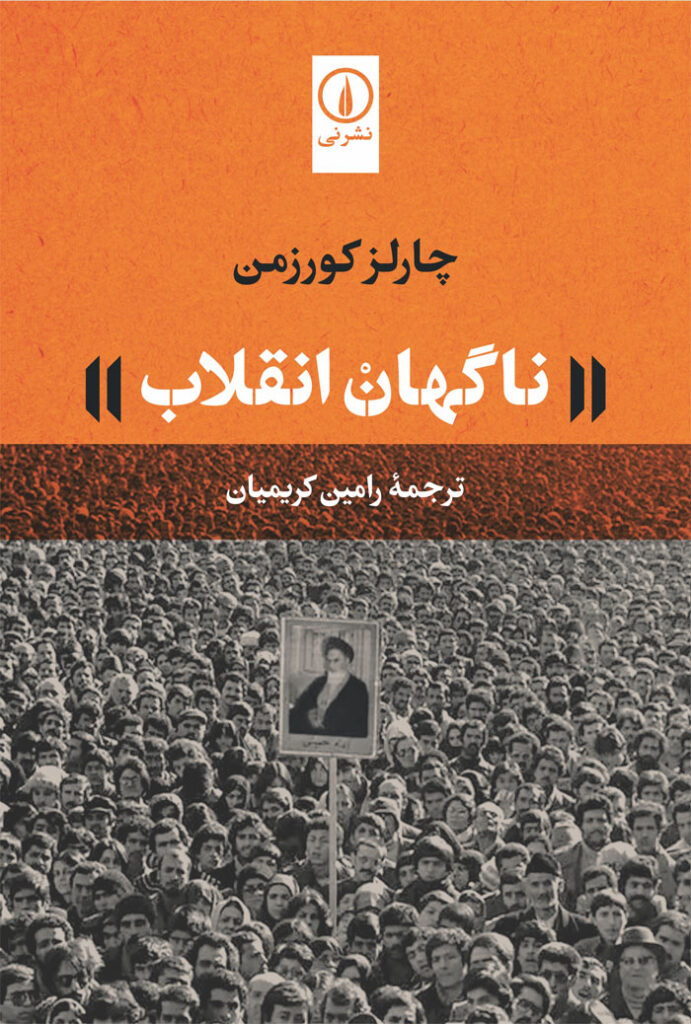 Charles Kurzman, The Unthinkable Revolution in Iran (Harvard University Press, 2004). Translated into Persian by Mohammad Molla-Abbasi as انقلاب تصورناپذیر در ایران (Enqelab-e Tasavor-Napazir dar Iran) (Tarjomaan, 2019), by Mohammad Karimi as انقلاب نااندیشیدنی در ایران (Enqelab-e Na-Andishidani dar Iran) (Soore Mehr, 2021), and by Ramin Karimian as ناگهان انقلاب (Nagehan Enqelab) (Nashr-e Ney, 2021). “The shah of Iran, Mohammad Reza Pahlavi, would remain on the throne for the foreseeable future: This was the firm conclusion of a top-secret CIA analysis issued in October 1978. One hundred days later the shah — despite his massive military, fearsome security police, and superpower support — was overthrown by a popular and largely peaceful revolution.” More…
Charles Kurzman, The Unthinkable Revolution in Iran (Harvard University Press, 2004). Translated into Persian by Mohammad Molla-Abbasi as انقلاب تصورناپذیر در ایران (Enqelab-e Tasavor-Napazir dar Iran) (Tarjomaan, 2019), by Mohammad Karimi as انقلاب نااندیشیدنی در ایران (Enqelab-e Na-Andishidani dar Iran) (Soore Mehr, 2021), and by Ramin Karimian as ناگهان انقلاب (Nagehan Enqelab) (Nashr-e Ney, 2021). “The shah of Iran, Mohammad Reza Pahlavi, would remain on the throne for the foreseeable future: This was the firm conclusion of a top-secret CIA analysis issued in October 1978. One hundred days later the shah — despite his massive military, fearsome security police, and superpower support — was overthrown by a popular and largely peaceful revolution.” More…
How would we know if we were witnessing a revolution in Iran?
 Charles Kurzman, “How Would We Know If We Were Witnessing a Revolution in Iran?” Monkey Cage, The Washington Post, December 19, 2022. “After weeks of protests in Iran, Iranians are asking the big question: Is the Islamic republic about to be overthrown? Some experts think it’s only a matter of time, but for all of our theoretical models and real-time news, the truthful answer is that nobody knows. Revolutions are inherently unpredictable.” More…
Charles Kurzman, “How Would We Know If We Were Witnessing a Revolution in Iran?” Monkey Cage, The Washington Post, December 19, 2022. “After weeks of protests in Iran, Iranians are asking the big question: Is the Islamic republic about to be overthrown? Some experts think it’s only a matter of time, but for all of our theoretical models and real-time news, the truthful answer is that nobody knows. Revolutions are inherently unpredictable.” More…
Acknowledging State Terrorism
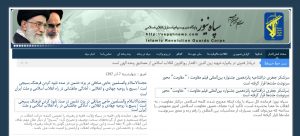 Charles Kurzman, “Acknowledging State Terrorism,” June 20, 2019. “The United States government now recognizes the existence of state terrorism. If the Iranian Revolutionary Guard Corps (IRGC) is a foreign terrorist organization, as the Trump administration announced in April, then what other government agencies around the world meet the Department of State’s statutory definition of terrorism: “premeditated, politically motivated violence perpetrated against noncombatant targets”?” More…
Charles Kurzman, “Acknowledging State Terrorism,” June 20, 2019. “The United States government now recognizes the existence of state terrorism. If the Iranian Revolutionary Guard Corps (IRGC) is a foreign terrorist organization, as the Trump administration announced in April, then what other government agencies around the world meet the Department of State’s statutory definition of terrorism: “premeditated, politically motivated violence perpetrated against noncombatant targets”?” More…
Hard-Liners Agree: Good Riddance to Iran Nuclear Deal!
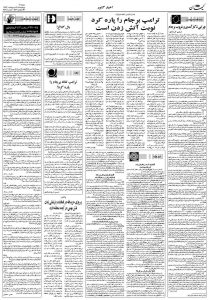 Charles Kurzman, “Hard-Liners Agree: Good Riddance to Iran Nuclear Deal!” June 1, 2018. Hard-liners in Iran agree with the Trump administration: The Iranian nuclear accord was a terrible deal, and never should have been struck! They were relieved when President Trump announced on May 8, 2018, that the U.S. government would reinstate sanctions against Iran, in violation of the 2015 Joint Comprehensive Plan of Action (JCPOA). Trump’s decision vindicated their own longstanding demands that Iran exit the agreement as well. The following day, the hard-line newspaper Kayhan (The Globe) published an article by Ebrahim Karkhaneyi, a member of the Iranian parliament who has opposed the nuclear deal for years. More…
Charles Kurzman, “Hard-Liners Agree: Good Riddance to Iran Nuclear Deal!” June 1, 2018. Hard-liners in Iran agree with the Trump administration: The Iranian nuclear accord was a terrible deal, and never should have been struck! They were relieved when President Trump announced on May 8, 2018, that the U.S. government would reinstate sanctions against Iran, in violation of the 2015 Joint Comprehensive Plan of Action (JCPOA). Trump’s decision vindicated their own longstanding demands that Iran exit the agreement as well. The following day, the hard-line newspaper Kayhan (The Globe) published an article by Ebrahim Karkhaneyi, a member of the Iranian parliament who has opposed the nuclear deal for years. More…
Understanding the U.S. and Iran
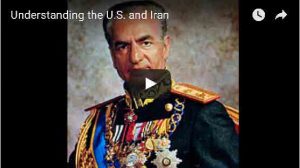 Charles Kurzman, “Understanding the U.S. and Iran,” Duke-UNC Consortium for Middle East Studies video series, “Middle East Explained,” March 15, 2017 (released July 10, 2017). “In this video, University of North Carolina-Chapel Hill Professor of Sociology Charles Kurzman recounts the often untold history of American-Iranian relations. Although Iran is often on the news as a problem for the United States, much of Iran’s pre-1979 Revolution history is not considered; Kurzman puts the current issues in historical context.” More…
Charles Kurzman, “Understanding the U.S. and Iran,” Duke-UNC Consortium for Middle East Studies video series, “Middle East Explained,” March 15, 2017 (released July 10, 2017). “In this video, University of North Carolina-Chapel Hill Professor of Sociology Charles Kurzman recounts the often untold history of American-Iranian relations. Although Iran is often on the news as a problem for the United States, much of Iran’s pre-1979 Revolution history is not considered; Kurzman puts the current issues in historical context.” More…
The Khomeini Wanna-Be
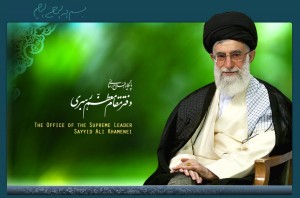 Charles Kurzman, “The Khomeini Wanna-Be,” November 26, 2013. “It is hard to go second in revolutionary politics. The founding leaders get the glory, while their successors live in an unflattering shadow, debasing themselves with each paean to their predecessor. Such are the indignities suffered by Ayatollah Ali Khamene’i of Iran. … Iran’s newly elected president, Hassan Rouhani, has apparently learned this lesson. After his administration crafted a preliminary nuclear accord this week, he obsequiously gave all credit to Khamene’i.” More…
Charles Kurzman, “The Khomeini Wanna-Be,” November 26, 2013. “It is hard to go second in revolutionary politics. The founding leaders get the glory, while their successors live in an unflattering shadow, debasing themselves with each paean to their predecessor. Such are the indignities suffered by Ayatollah Ali Khamene’i of Iran. … Iran’s newly elected president, Hassan Rouhani, has apparently learned this lesson. After his administration crafted a preliminary nuclear accord this week, he obsequiously gave all credit to Khamene’i.” More…
Deaths Tolls of the Iran-Iraq War
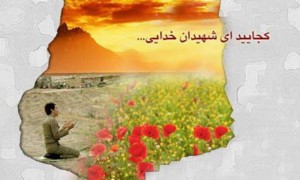 Charles Kurzman, “Death Tolls of the Iran-Iraq War,” October 31, 2013. “The Iran-Iraq War of 1980-1988 scarred both countries deeply, with horrific fighting at the battlefront and long-range missile attacks on cities. But postwar censuses in Iran and Iraq suggest that the war’s death toll may not be nearly as high as is commonly thought.” More…
Charles Kurzman, “Death Tolls of the Iran-Iraq War,” October 31, 2013. “The Iran-Iraq War of 1980-1988 scarred both countries deeply, with horrific fighting at the battlefront and long-range missile attacks on cities. But postwar censuses in Iran and Iraq suggest that the war’s death toll may not be nearly as high as is commonly thought.” More…
Cultural Jiu-Jitsu and the Iranian Greens
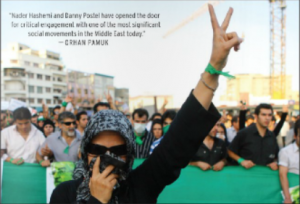 Charles Kurzman, “Cultural Jiu-Jitsu and the Iranian Greens,” in Nader Hashemi and Danny Postel, editors, The People Reloaded: The Green Movement and the Struggle for Iran’s Future (New York: Melville House, 2011), pp. 7-17. “On June 12, 2009, the day of Iran’s presidential election, we knew something was wrong when the government shut down the opposition’s election-monitoring system.” More (slideshow)…
Charles Kurzman, “Cultural Jiu-Jitsu and the Iranian Greens,” in Nader Hashemi and Danny Postel, editors, The People Reloaded: The Green Movement and the Struggle for Iran’s Future (New York: Melville House, 2011), pp. 7-17. “On June 12, 2009, the day of Iran’s presidential election, we knew something was wrong when the government shut down the opposition’s election-monitoring system.” More (slideshow)…
Reading Weber in Iran
 Charles Kurzman, “Reading Weber in Tehran,” Chronicle of Higher Education, November 1, 2009. “An unlikely suspect was fingered at the recent show trials of Iranian dissidents: Max Weber, whose ideas on rational authority were blamed for fomenting a ‘velvet revolution’ against the Islamic Republic.” More…
Charles Kurzman, “Reading Weber in Tehran,” Chronicle of Higher Education, November 1, 2009. “An unlikely suspect was fingered at the recent show trials of Iranian dissidents: Max Weber, whose ideas on rational authority were blamed for fomenting a ‘velvet revolution’ against the Islamic Republic.” More…
Ignore All the Iran Experts
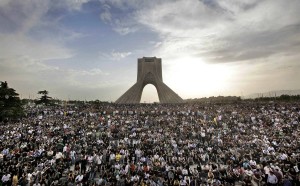 Charles Kurzman, “Ignore All the Iran Experts,” ForeignPolicy.com, June 17, 2009. “Troops are out in Iran this week, but in many cases the crowds have grown so large that the security forces are standing back and letting them swarm silently and peacefully through the boulevards — just like in 1978. … But the biggest similarity between the current protests and the Islamic revolution is the population’s widespread confusion about what comes next. In a year from now, people will look back on this week and say that what happened was inevitable. Whatever happens, they will predict the outcome retroactively.” More…
Charles Kurzman, “Ignore All the Iran Experts,” ForeignPolicy.com, June 17, 2009. “Troops are out in Iran this week, but in many cases the crowds have grown so large that the security forces are standing back and letting them swarm silently and peacefully through the boulevards — just like in 1978. … But the biggest similarity between the current protests and the Islamic revolution is the population’s widespread confusion about what comes next. In a year from now, people will look back on this week and say that what happened was inevitable. Whatever happens, they will predict the outcome retroactively.” More…
A Feminist Generation in Iran?
 Charles Kurzman, “A Feminist Generation in Iran?” Iranian Studies, Vol. 41, No. 3, June 2008, pp. 297-321. “Educated young women are significantly more likely to espouse feminist attitudes of various sorts than other Iranians, including educated young men. In addition, educated young women are significantly more likely to work outside the home, marry later, give birth later, have fewer children, and have more egalitarian marriages than other Iranian women. However, surprising proportions of older Iranians also espouse feminist attitudes, and a majority of respondents in one nationally representative sample of urban Iranians identify themselves as proponents of women’s rights.” More…
Charles Kurzman, “A Feminist Generation in Iran?” Iranian Studies, Vol. 41, No. 3, June 2008, pp. 297-321. “Educated young women are significantly more likely to espouse feminist attitudes of various sorts than other Iranians, including educated young men. In addition, educated young women are significantly more likely to work outside the home, marry later, give birth later, have fewer children, and have more egalitarian marriages than other Iranian women. However, surprising proportions of older Iranians also espouse feminist attitudes, and a majority of respondents in one nationally representative sample of urban Iranians identify themselves as proponents of women’s rights.” More…
(The survey dataset for this paper is available through the Odum Institute for Research in Social Science at the University of North Carolina at Chapel Hill.)